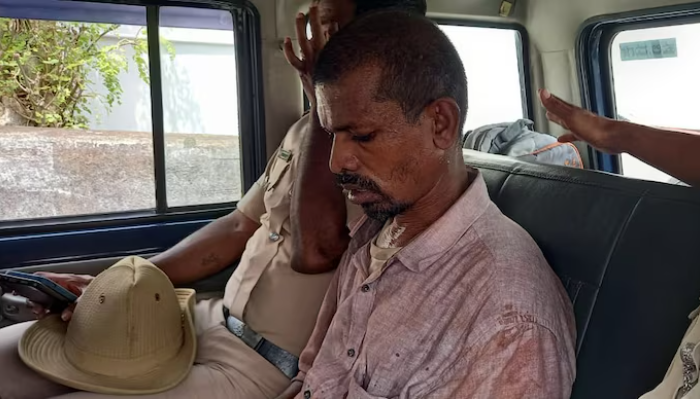
According to NDTV, on the night of May 27, Shivarama from Tumkur, Karnataka, was arrested for murdering his wife, Pushpalatha, after she refused to serve him food.
Shivarama not only killed her but also decapitated her and removed her skin.
The 35-year-old woman’s body was discovered in the kitchen of their home in the village of Huliyurudurga.
The couple, married for over ten years, had an eight-year-old son and lived in a rented house.
Shivarama had peeled off his wife’s skin, exposing her veins and intestines, leaving her body lying in a pool of blood next to her severed head.
As News18 reported, the incident occurred after Shivarama, who worked at a sawmill, returned home on Monday night.
The couple argued about his job, a frequent source of tension.
After Pushpalatha refused to serve him dinner, the argument escalated, leading Shivarama to stab her in a fit of rage and then mutilate her body with a machete.
He continued to skin her until the early hours of May 28, while their son slept inside the house.
Shivarama confessed to his landlord and employer the following day, who immediately alerted the police.
Ashok Venkat, Tumkur Superintendent of Police, stated while speaking to India Today, “A 35-year-old female’s body was found at the scene, and her husband confessed to the murder during questioning. We have secured the accused. Shivaram and Pushpa had minor fights throughout their ten-year intercaste marriage. Last night, they argued over employment issues, leading to this tragic incident. The body has been sent for post-mortem examination.”
Violence against women in India

The frequency of crimes against women has risen dramatically in India in recent years.
From public spaces to private homes, women face a myriad of threats, including penetrative sexual assault, dowry deaths, female infanticide, forced child marriage, abduction, and acid attacks.
Public spaces are one of many areas of concern; private spaces are equally unsafe.
Domestic violence cases – ranging from marital rape and dowry deaths to mental torture, bride burning, and female infanticide are reported daily.
Despite the prevalence, only a fraction of these crimes are reported, and even fewer perpetrators face punishment.
Societal gender roles dictate how individuals should speak, behave, and dress based on their sex.
These roles, which have long dominated our society, contribute significantly to violence against women.
Women are expected to exhibit traits such as sensitivity, dependency, submissiveness, and emotionality. In contrast, men are expected to be aggressive, independent, dominant, and less sensitive. This stereotyping fuels oppression against those who defy these traditional roles.
Gender roles are societal constructs, not inherent traits. While some argue for their continued relevance, modern communities increasingly find them unnecessary.
Both men and women can perform the same essential activities, rendering gender-specific behaviours obsolete.
Yet, these norms persist, legitimizing and defending gender inequality and violence against women.
Alcohol consumption frequently emerges as a factor in domestic violence.
Numerous cases involve husbands exhibiting violent behaviour towards their partners after drinking.
Alcohol is often viewed as a stress reliever, but it also exacerbates aggressive tendencies, leading to increased violence against women.
High-profile cases, such as those involving Manu Sharma and the Nirbhaya incident, highlight alcohol’s role in such crimes.
Cultural practices also contribute to violence against women.
Age-old customs like Sati, child marriage, and honour killings are stark examples.
The COVID-19 pandemic worsened the issue, with lockdowns leading to a surge in domestic violence cases.
Confinement and heightened stress levels resulted in more instances of abuse, with many victims unable to seek help.
To combat violence against women, we must address its root causes.
Gender equality should be a foundational aspect of education for both sexes.
Women need to be encouraged to speak out against violence, and awareness about cybercrimes must be raised to ensure offenders are held accountable.
RELATED: Why is child marriage still prevalent in India despite efforts to combat it?
Creating a gender-egalitarian society is crucial to dismantling the power-based hierarchy that perpetuates violence against women.
Effective laws and legislation are necessary to ensure women’s safety and equality in India.





